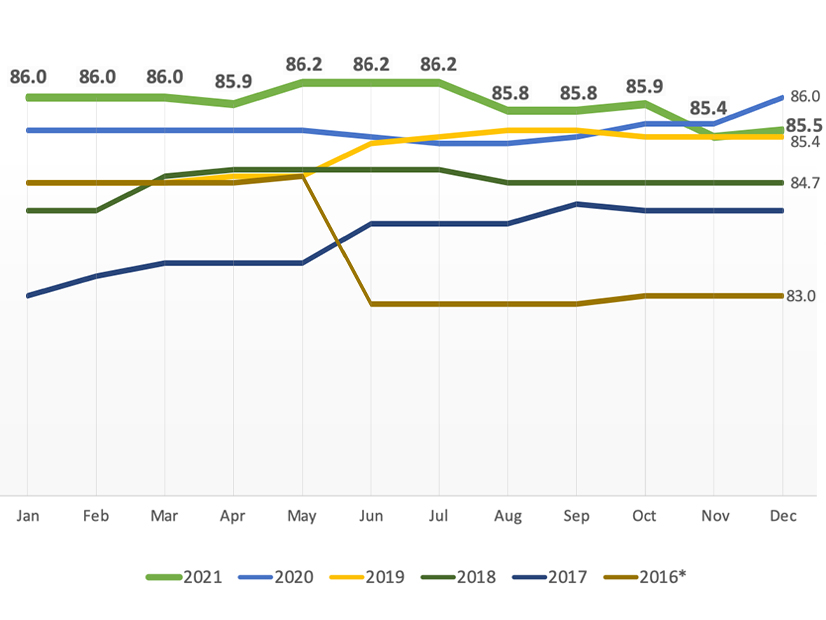
In-person Meetings to Resume in March
NYISO plans to resume in-person stakeholder meetings in the second week of March, CEO Rich Dewey told the Management Committee on Wednesday.
“Infection rates for COVID continue to drop regularly both in this area and in the region … so Member Relations Manager Mark Seibert and his team will coordinate with each of the committee chairs to work out individual schedules,” Dewey said.
As usual, the remote option will still be available for individuals who are uncomfortable meeting in person or are not ready to do so, and all visitors to NYISO must demonstrate proof of vaccination.
Dewey also reported that Vice President of Operations Wes Yeomans is retiring in May, and that the Board of Directors has approved Aaron Markham, currently director of grid operations, to succeed him.
“I think everybody who knows Aaron will agree that he’s a very capable replacement,” Dewey said. “We’re lucky to have him, so congratulations to Aaron Markham.”
Survey Metrics Decline Slightly
The ISO’s annual survey of customer satisfaction for 2021 posted a slight decline compared to the previous year, down from 91.5% to 91.1%. Assessment of performance also declined from 77.6% to 77%.
Nonetheless, the survey resulted in the second highest combined score — 85.5%, down from a record 86% last year — since adopting a new survey platform five years earlier, said Don Levy, director of the Siena College Research Institute. The combined score is calculated by combining 60% of the satisfaction score and 40% of the performance score.
Areas with declines in satisfaction included transparent operations; explanation of policies and procedures; and considerations of individuals’ input. In performance, NYISO saw declines in conducting comprehensive long-term planning; advancing the technological infrastructure of the grid; and providing factual information to policymakers, stakeholders and investors.
Areas that showed improvement included satisfaction with the professionalism of NYISO personnel; fair handling of all interactions; and timeliness in communicating key market issues. Performance improvements included reliably operating the grid and administering open and competitive markets.
ISO Staff Get 3% Raise
NYISO has found it difficult to recruit and retain qualified employees in 2021 and 2022. To assist in those efforts, the Management Committee recommended that the board approve a plan to use roughly half the $10.7 million in funds remaining from the 2021 budget cycle to adjust staff salaries to more closely reflect market rates, including an immediate increase of 3%.
The ISO overcollected $7.9 million on 2021 Rate Schedule 1 revenues and underspent the budget by 1.7%, or $2.8 million, CFO Cheryl L. Hussey said.
The MC recommended to the board that the ISO use $5 million for the staff raise and retain the remaining $5.7 million until a comprehensive salary benchmarking process is completed, in the event the results show additional salary actions or retention incentives are needed.
Any remaining funds from the 2021 budget cycle, following potential salary actions informed by the salary benchmarking, will be used to pay down the principal amount of outstanding debt in 2022.
Dewey explained that the ISO is exploring all avenues to recruit and retain qualified employees. “Increasingly it’s not always just about the money; it’s about the work schedule and degrees of flexibility and options that people have,” Dewey said. “We’re paying very careful close attention to what other companies are offering and trying to make sure that we remain competitive.”
The MC last year recommended that if a Rate Schedule 1 overcollection and/or a spending under-run occurred, the related funds should be utilized to pay down the principal amount of outstanding debt or reduce anticipated debt borrowings.
External Outreach Update
NYISO has been promoting its Comprehensive Reliability Plan (CRP), engaging lawmakers in Albany on bills of interest to stakeholders, said Kevin Lanahan, NYISO vice president for external affairs and corporate communications.
Those included outreach to lawmakers on the Pollution Justice Act (S4378), which would require peaker plants to be replaced by renewable resources and/or storage facilities within five years of the renewal of a facility operating permit or retire by the end of 2025.
The bill would allow for one five-year extension of the deadline if the transmission owner and NYISO both attest in writing to the discovery of a reliability need if the plant were to retire or be forced to convert to renewable resources.
The ISO also publicized its CRP, which highlights tightening reliability margins over the next decade.
“The response by and large has been excellent, thoughtful and everything we would have hoped for as we began the promotional program to draw attention to the CRP,” Lanahan said.
The ISO received a lot of good, in-depth questions from U.S. Senate Majority Leader Chuck Schumer’s (D-N.Y.) office, for example. State Senate Energy Committee Chairman Kevin Parker has also invited Dewey to address the committee at an upcoming meeting and go over the CRP findings in detail, Lanahan said.


